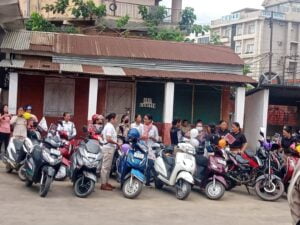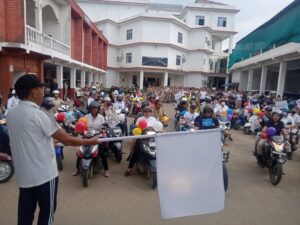When asked whether or not detailed data on the number of persons indulging in substance abuse in the commercial hub of Nagaland, Dimapur were available, the CP said that his department is not the competent authority to furnish the details.
By Imna Longchar, TFM Nagaland Correspondent
Dimapur on Saturday witnessed assemblage of police personnel including women police as they gear up to observe “international day against drug abuse and illicit trafficking” on Sunday.
Before flagging of the programme, Commissioner of Police, Dimapur, Rothihu Tetseo highlighted the role of the Nagaland police especially in Dimapur in curbing the menace of drugs and other related substance abuse.
He said observing the day was very significant as it also gives a peek into how “substance abuse and trafficking” could be very abusive through the medium of the planned painting and essay competitions for school children organized by the different units (police stations) under the aegis of PHQ, Kohima, in creating awareness.
Also highlighting the role of the uniformed personnel in securing respect while dealing with “drug abuse and illicit trafficking”, Tetseo mentioned that the Nagaland police has already set up a Narcotic Cell controlled under PHQ and has a superintendent of police ranked officer to look after the issues.
Though lamenting that the records and achievements in controlling it over the years might not be “100 percent” satisfactory in especially in Dimapur, however, the CP pointed out that apart from executing its normal duty (s), the commissionerate has the distinction of giving priorities and importance to fight against the social menace as per the policy of the government of India and also with assistance from various departmental agencies.

When quipped on whether detailed data or ratio (records) on the number of persons of the substance abuse in the commercial hub of Nagaland, Dimapur, available, Tetseo said that his department is not the competent authority to furnish the details.
He also shared that one should not be “very negative” while “talking the talks” on substance abuses in the state as comparatively the numbers have narrowed down unlike the many years back.
DCP (Hq), Mhalo Ezung, while addressing the participants on “drug challenges in health and humanitarian crisis”, refreshed the minds of everyone assembled that the day “international day against drug abuse and illicit trafficking or world drug day” is a United Nations International day against drug abuse and the illegal drug trade.

Observing the international day every year on June 26 to commemorate Lin Zexu’s dismantling of the opium trade in Humen, Guangdong, ending on June 25, 1839, just before the first “opium war” in China, Ezung reminded that the observance was instituted by General Assembly Resolution on December 7, 1987.
She also highlighted that it was in the month of June, 1987, at the international conference on “drug abuse and illicit trafficking” held at Vienna, the conference recommended, drafted and resolved that an “annual day” should be observed to mark the importance of the fight against drug abuse and illicit trafficking which is observed globally to strengthen action and cooperation in achieving a “world free of drugs”.
Also stating that each year individuals, every communities and different organizations from across the world join in to observe the day in order to help raise awareness of the major problems that illicit drugs pose to society, Mhalo Ezung, also said that this year with the theme “addressing drug challenges in health and humanitarian crisis”, the UN office of drug on “drugs and crime” (UNODC) is addressing transnational drug challenges stemming from situation crisis.
As the world continue to widespread humanitarian crisis in Afghanistan, Ukraine and elsewhere, the COVD-19 pandemic is still also a major global health crisis but the “synthetic drug crises” requires “nimble and adaptable” solutions, she said. She further urged to make efforts in tackling the “drug challenges” in whatever possible ways one could do in making Nagas society a better place to live in through the campaign.
Women police and other women participants from different NGOs numbering more than 40 with two wheelers proceeded towards Chomoukedima and back to CP’s office while the male folks led by CP, Dimapur, Rothihu Tetseo, who initiated the foot rally culminated at his office covering many locations including the Clock Tower, Dimapur. All participants including the women personnel were acknowledged with certificates sponsored by Rotary Club, Dimapur.
